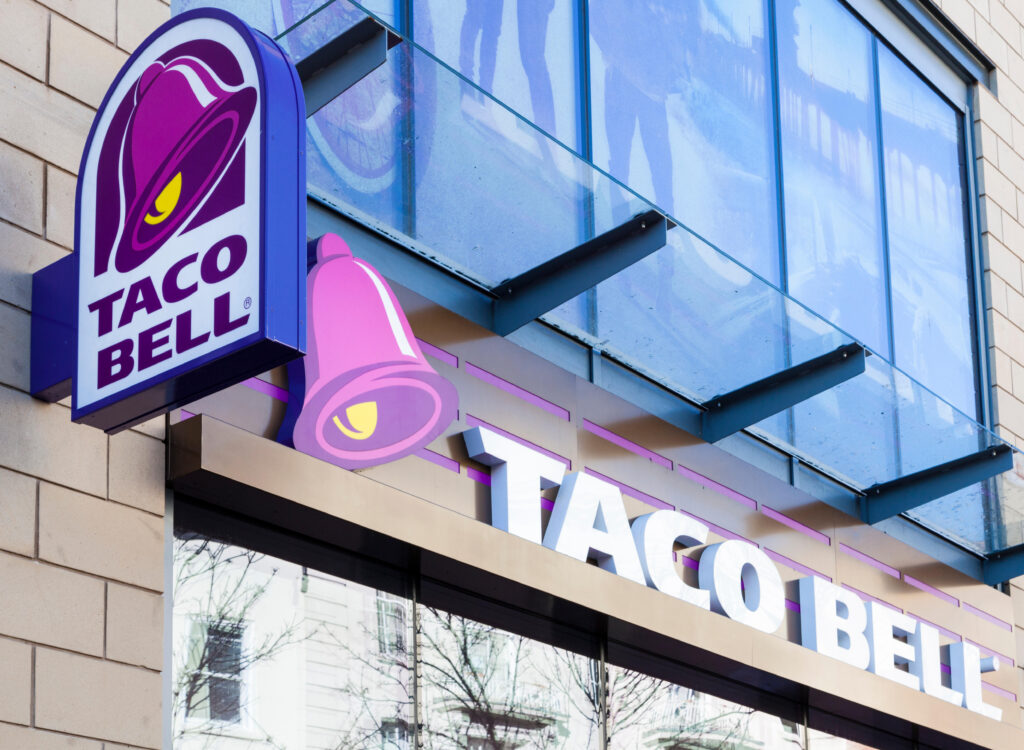
What follows is a case study by Alex King, republished from Bloomsbury Contemporary Aesthetics, the newest module of the Bloomsbury Philosophy Library. Bloomsbury Contemporary Aesthetics is anchored by a set of exclusive and original case studies contributed by some of the leading voices in aesthetics today, and written to introduce new students to the broad range of topics in aesthetics and the philosophy of art, from interpretation and ontology to appropriation, taste, curiosity, and the aesthetics of confusion. More information on Bloomsbury Contemporary Aesthetics follows at the bottom of the page.
He leaned over, laughing, and sneered just a little: “But like, ironically, right?”
I had just told him that I loved Taco Bell.
And no, I don’t like it ironically. And I don’t like it as a funny stoner food. I love it with a purity made possible only by the innocence and cultural obliviousness of childhood. As a child, I was an extraordinarily picky eater, and the humble hard-shell taco was interesting without being disturbing or totally unfamiliar. One year, I made a full-body taco Halloween costume. I had a little Taco Bell-branded plush chihuahua that, when squeezed, emitted a tinny “Yo quiero Taco Bell,” in keeping with their hugely successful ad campaign of the time. In high school, it was an inexpensive but tasty drive-thru option, and less basic than McDonald’s. Friends and I would come home from sports or extracurriculars, be on the way to a party, or be hanging out and driving around – as one does when one does not live in a city – and hitting up the Taco Bell was something to do. In college, I had a part-time job across the street from a Taco Bell and would often run over to grab a quick bite on my break, or send a friend over with an order. Even as an adult, I’ll sometimes drop by after work, if I’m too tired to cook, and I still regularly indulge with my childhood friends. So you can see how Taco Bell has come to have a special place in my life. And while my preferred menu items have morphed over time, two things have not: I still find it delicious, and I still love it, wholly without irony.

“But Like, Ironically”: The Paradox of Ironic Appreciation
What was my friend asking me when he asked whether or not I liked it ironically? What is it to like something ironically?
The idea of ironic appreciation is puzzling, if not outright paradoxical. If you like something ironically, do you actually like it or not? That is the puzzle. The paradox is that the answer often seems to be both yes and no. You like a thing, but you don’t really like it. You like it – wink, wink.
There are two obvious ways to resolve this paradox, but neither of them really works. One is that you just like it, without any dislike involved; and two, you just dislike it, with no liking involved.
To see why the first option can’t be right, imagine that you say that you like something ironically, and someone follows up with, “Oh, so you do like it?” The answer isn’t a straightforward yes. The answer is something like, “Sort of,” “Not quite,” or, “Not exactly.”
The second option seems closer, actually. Notice that the wink-wink resembles how we’d behave if we were sarcastically joking with each other. Suppose you just tried to swat a fly, but you ended up breaking a window instead and the fly escaped anyway. I might say, “Well done,” with the same kind of winking tone. What I say is “Well done,” but what I mean is, “Wow, terribly done. Completely botched.”
Sarcasm, in essence, negates what is said, adding some humor or a hint of insult. If I utter a sentence sarcastically, what I communicate is the negation – or even the opposite – of what the sentence says. If this is how ironic liking works, then, when we say we like a thing ironically, what we mean is that we don’t like it at all, or even that we strongly dislike it. But a statement of ironic liking doesn’t mean the opposite of (simply) liking. Think about a sarcastic use of a statement about what you like. If I say, “Oh, I really like Taco Bell,” in a sarcastic tone and with a roll of the eyes, then what I mean is that I don’t like it at all. But this sentence doesn’t mean the same thing as “I like Taco Bell ironically.” A statement of ironic liking seems to harbor some element of liking, along with some element of non-liking. So how else might we try to understand ironic appreciation?

Resolving the Paradox
Two other strategies assume that one of the feelings is more basic than the other. On one strategy, when you like something ironically, you like it, but some other, more complicated feelings are also involved. On the other strategy, you dislike it, but some other, more complicated feelings are involved.
Let’s look at the first strategy. Suppose that you really do like the object of your ironic appreciation. What are those other, more complicated feelings that are involved? One possibility is that you know that it’s ridiculous that you like it – and that’s part of the fun. On this option, ironic appreciation is a fundamentally silly, humorous, fun attitude. The feeling of ironic appreciation is itself enjoyable. You lean into that ridiculousness in joyful abandon.
A second option is that you like it, but you know that it’s not actually very good, and so you think that you shouldn’t like it. This makes ironic likings out to be more or less the same as what we often call ‘guilty pleasures.’ You feel guilt at confessing to liking a guilty pleasure because you believe that it isn’t actually worthy of your or anybody’s liking. And yet, in spite of yourself, you can’t help but like it. This makes ironic appreciation into a somewhat less joyful experience. It’s tinged with shame and guilt and other negative feelings. You might want to hide it, rather than joyfully revel in it.
A related, third possibility uses a classic dictionary definition of irony: something that happens which is counter to what is expected. On this view, you like something, but you know that it’s not the sort of thing that you or someone like you (of your taste class, your socio-economic or cultural class, your group, or simply you in particular) would normally like. It’s unexpected for you to like it, since – for example – you usually have much more mainstream or fancy tastes.
In contrast, suppose that ironic appreciation essentially involves disliking, rather than liking something. What could the more complicated feelings be here? Maybe you think it would be funny if you really did like it, or maybe you like pretending to like it. This is also related to the previous possibility because it relies on the unexpected in some way. How funny would it be if someone like you liked Taco Bell? Of course you don’t actually like it, but wow is it hilarious when you wear that Taco Bell hat with a totally serious look on your face.
I’ve given four options for what ironic appreciation could be – three based on liking, one based on disliking. But I think the reality is that ironic appreciation is used by different people in slightly different ways, and there is no single thing that it means. Still, all of these possibilities share a few core features, which we can use to understand the essence of ironic appreciation.
First, it involves a tension between liking and disliking. There are two sides to ironic appreciation, one of which involves at least something like liking, and the other of which involves at least something like disliking. Second, it involves some kind of personal distancing. Ironic appreciators want to distance themselves from simple liking through the acknowledgement of some more complicated feelings – by deploying humor or pretense, or by admitting guilt or shame.
A third but not less important criterion is that ironic appreciation presupposes some level of superiority and inferiority, and moreover it presupposes that one allies oneself with the superior and against the inferior. To see this, look more closely at the third and fourth possibilities above. Merely that something is unexpected for you to like cannot form the grounds of ironic appreciation. Imagine a rural mother of three who likes country music and Nicholas Sparks novels. What if I told you that she also likes – not cute paintings of cats and farmsteads, but gritty post-war German painting? This is certainly unexpected. What would you think if she said: “I like post-war German paintings, but only ironically.” It is nearly unintelligible. On the other hand, imagine a PhD student at an Ivy League university who likes Bauhaus architecture and art house films. What if I told you that she also likes Taco Bell? That’s probably unexpected. What would you think if she said: “I like Taco Bell, but only ironically.” (Note: That is a fair description of me at the time of my encounter with my friend, but that is not what I said.) This is at least intelligible, even if all of the details of what she thinks are actually – as I’ve argued above – difficult to get a full handle on. But it works by tacitly sneaking in the assumption that she thinks she is somehow superior to the people who normally like Taco Bell; or else she thinks that the other things she likes are superior to Taco Bell. What makes this hard to interpret in the rural mother case is that the typical social esteem accorded to these different objects is flipped. We would have to think that the rural mother believed herself to be superior to people who normally like post-war German painting, or as believing the things she actually likes to be superior to post-war German painting. We might even have to imagine a situation where her interlocutor and her subculture more broadly shared those assumptions. If you really try hard to imagine this, I think you can make her statement intelligible.
You can see this element of superiority and inferiority run through the other options, too. What makes the fact that you like something silly or ridiculous? It can happen when you take your liking something to be the kind of attitude that could expose you to literal ridicule. And why would liking certain things obviously open you up to ridicule, while others would not? In general, lots of things can open you up to ridicule, but here, it seems to be because you and others around you think that you are, as people sometimes say, better than that. Turning to the second possibility, what makes something a guilty pleasure? Just that you believe you shouldn’t like a thing, but you like it anyway. Why do you think you shouldn’t like it? Because it isn’t good. It’s a weakness or a blind spot in your aesthetic judgment that you like it. It appeals to something baser in you.
So what was my friend asking me, when he asked whether or not I liked Taco Bell ironically? Maybe he was asking me if I felt some tension between liking and disliking regarding Taco Bell. (No, I simply don’t dislike it.) Or maybe he wanted to give me the opportunity to distance myself from that liking – or even to give me the opportunity to signal some in-group superiority over other groups of people. (I emphatically did not want to do either.)
It looks like I don’t appreciate Taco Bell ironically. But there is a further, perhaps more interesting question to ask about this encounter. Why did he ask whether I liked it ironically? By this, I don’t mean why was he wondering about it or why was he surprised to hear me say that. I mean, rather, what are the underlying conditions and suppositions that made this a reasonable question to ask? I think the answer has to do with a presumed connection between quality and class, and it will build on the ideas of distancing and superiority that we’ve just discussed.

Class and Distinction
On the best sense I can make of it, you appreciate something ironically when there is a tension between your like and dislike of it, and you want to distance yourself from the liking part because you take the object of ironic appreciation to be unexpectedly beneath you. The different models of ironic appreciation are simply different ways of fleshing out the details of the relationship between your like and dislike, but they all share these core features.
This makes ironic appreciation depend in very important ways on cultural expectations and how they relate to the expectations we have of ourselves and each other. When we sort people (which we inevitably do) into different cultural classes, that informs what we expect them to like. When we sort ourselves into those classes, it informs what we expect – or even want – ourselves to like.
In general, we expect members of high culture classes, like gallerists or film critics, to like things that are difficult but rewarding and insightful. We expect members of lower culture classes, like the rural mother described earlier, to like things that are pleasant, easy, and entertaining. So a gallerist might like an abstract performance art piece like Yoko Ono’s Cut Piece, which involved her sitting on a stage and instructing viewers to come up and use a pair of scissors to cut from the suit she was wearing. But most people who are not members of this cultural class see this piece and wonder, what’s the point? They might even doubt that there is a point. Conversely, the mother might like Nicholas Sparks’ The Notebook, which tells the romantic story of how an elderly, married couple fell in love and the lives they have lived. But this novel is roundly believed to be sentimental drivel by members of high culture.
In this vein, people sometimes talk in terms of highbrow and lowbrow art and audiences. Highbrow audiences are the gallerists and critics – in general, people who are heavily involved in the art world or highly educated. Lowbrow audiences are everyone else. And highbrow art is the art that highbrow audiences like; lowbrow art is the art that lowbrow audiences like.
The distinction between highbrow and lowbrow art manifests in different aesthetic arenas. We use it to sort very broad things or very narrow things. We can sort categories of artistic media, where what is highbrow are fine arts and what are lowbrow are the applied arts. We can sort artistic media themselves (opera vs. fashion), cross-medium artistic movements (Romanticism vs. pop art), or genres (drama vs. horror). We can sort works within a single medium (the movies of Jean-Luc Godard vs. Michael Bay) or within a single genre and medium (the pop music of Lady Gaga vs. Britney Spears).
Inevitably, people will disagree about the particulars, but these are just examples meant to illustrate the general classification. And, as some items on the list may reveal, it is not only limited to art, properly or narrowly understood. In every sphere of aesthetic experience, people sort things into highbrow and lowbrow categories – the difficult and demanding as opposed to the accessible and easy. There are highbrow fonts like Helvetica and lowbrow fonts like Comic Sans, just as there are highbrow foods – haute cuisine and molecular gastronomy – and lowbrow foods, such as Taco Bell.
Against the background of highbrow and lowbrow culture and art, ironic appreciation begins to make a lot more sense. When people confess to an ironic appreciation of something, they imply that they are a member of a high culture audience and that what they like is one of the low culture objects. That’s why they want to distance themselves from their appreciation of it. This also explains a different paradox lurking within ironic appreciation, which is that – though it seems like it should be embarrassing to confess (it is a confession after all) – people are sometimes strangely proud to talk about their ironic appreciation. Why should that be? If I’m right, it’s because doing so signals that the ironic appreciator, though they like some piece of low culture art, is nevertheless a discerning member of the high culture audience.
This analysis echoes the French sociologist Pierre Bourdieu. In his book Distinction, Bourdieu argues that we use social and cultural symbols to signal things about ourselves to others, and he discusses how the culture around us informs (and pollutes) much of our aesthetic appreciation. This is how we distinguish ourselves from others, how we achieve distinction. I’m arguing that ironic appreciation does just that, but in a way that is not immediately obvious. While some authors rail explicitly against low art, mass art, or popular art (Greenberg 1988; Macdonald 1962), such overt snobbery is not usually well received. But perhaps ironic appreciation is a sneakier way to do the same thing.
This means that ironic appreciation is not morally innocent. It depends on a worldview where some groups of people are better than others – smarter, more insightful, more sophisticated, even more dedicated and hard-working (because they forgo easy pleasures for more difficult artistic rewards). It also depends on a view of oneself where it is important that one be in the superior group. The very terminology of highbrow and lowbrow betray this: the terms originate in phrenology, the pseudoscience of determining people’s psychological traits – for instance, intelligence – from the shape of their skulls. It was a pseudoscience used to reinforce racism, sexism, classism, and other prejudicial beliefs and practices. I am not saying that ironic appreciation is as pernicious as phrenology. But ironic appreciation, too, depends on and endorses viewing the world through a lens of superiority and inferiority. In other words, ironic appreciation can avoid overt snobbery, but it depends on a snobbish attitude nonetheless.
So why did my friend invite me to distance myself from my liking Taco Bell? Why did he think that I would receive that well?
He thought that I would want to distance myself from the types of people who typically like Taco Bell, as opposed to the types of people who typically go to expensive, gourmet seven-course dinners (which I have also been known to do). He thought that I would welcome the opportunity to distance myself from that group, because I would welcome the opportunity to present myself as superior to them. Perhaps he even thought that I would like to include him in that in-group, implicitly, by confessing an appreciation that he could recognize only as ironic.
Fortunately, there is an antidote for ironic appreciation. It is sincerity and open-mindedness. We should approach artworks and aesthetic experiences with open-mindedness and try our best to set aside cultural biases (whether our bias is skepticism about high art, disdain for low art, or something else). We should approach aesthetic objects on their own terms and be open to what they have to show us. Some art may indeed be bad; other art may indeed be good. But we won’t figure out what is good and what is bad by bringing prejudices to our experience. Only then can we experience things with sincerity. If a work has something insightful to say, we can receive that insight earnestly. If a photograph is beautiful, we can genuinely enjoy its beauty. And if a mass-produced hard-shell taco tastes good and reminds us of home, we can eat it and love it without a trace of irony.
Alex King is Associate Professor of Philosophy at Simon Fraser University and is the Editor-In-Chief of Aesthetics for Birds. She works on issues at the intersection of ethics and aesthetics, including meta-ethics and meta-aesthetics.
This article is one of the case studies published in the Bloomsbury Contemporary Aesthetics module of the Bloomsbury Philosophy Library.
Designed for undergraduates, postgraduates, faculty, and scholars in philosophy, literature, and visual arts, Bloomsbury Contemporary Aesthetics features primary texts, exclusive case studies, a bank of images, a digital-only reference work, Aesthetics and Politics in the Global South, as well as monographs, study aids, and edited collections covering aesthetics across the humanities.
Aesthetics for Birds readers can get temporary access to Bloomsbury Philosophy Library at www.bloomsburyphilosophylibrary.com by logging in with the following credentials at the top right-hand corner of the web page:
Username: AestheticsforBirds2023
Password: 2023Aesthetics
Access expires on 30th April 2023.



March 30, 2023 at 11:48 am
Those who love Taco Bell should be aware of a question of distributive justice not addressed here. Some Taco Bell tacos have only about a half or third or even quarter of the filling that some other Taco Bell tacos have. Such, at least, is consistently the case in Missoula, Montana. The beef in a Quarter Pounder or Whopper is pretty much quantum. McDonald’s and Burger King could never get away with serving only half a patty. But some Taco Bell franchisees regularly stint on not just beef but also lettuce and cheese. Personal whim of individual taco-fillers may account for part of the shortfall. On-the-fly Bayesian calculations as to what the customer will put up with may also play a role. The haste imposed by the neoliberal business clock cannot be ignored. But the problem is systemic, embedded in the corporate culture and enshrined in the bottom line. Corporate bean counters know what’s going on. Indeed, research confirms that only the most well-endowed Taco Bell tacos ever make it into Taco Bell’s photo-iconography. No one has ever complained about an overly full Taco Bell taco. Consumers blithely consume with no apparent concern about truth-in-advertising. (If you interrupt your meal or snack and go up to the counter and complain, they will probably give you some fuller tacos. But who wants to have to do that?) Unlimited social science data and new anecdotal evidence are readily available, so brazen is the fraud. Bad money drives out good but given their addictive nature skimpy Taco Bell tacos drive up taco sales and net revenues. All this suggests the hypothesis that either federal, state, and local prosecutors never eat tacos at Taco Bell — which is highly unlikely — or they have by their silence in effect immunized this chicanery. Activist trial lawyers may wish to consider the applicability of RICO. Undercover video stings could accomplish a lot. Forensic aestheticians should monitor the situation.
March 31, 2023 at 5:35 am
I,suppose there is validity to ironic appreciation. Some folks I know get a craving for White Castle hamburgers. They buy a half-dozen, scarf them down and don’t touch one again for weeks or months. Their must be many of these customers. White Castle thrives, after all these years.
March 31, 2023 at 6:22 am
Fantastic piece! Thanks so much for it.
March 31, 2023 at 10:51 am
It’s the sauce. I have a case of it stored in my food pantry right now, for home use.
March 31, 2023 at 1:12 pm
I have a cup full of packets squirreled away in my cabinet too!
April 6, 2023 at 8:51 am
People who like something ironically like something, but believe they are smarter, cooler, and/or have better taste than other people that like it.
That’s pretty much what you said, I think. But shorter.
April 11, 2023 at 12:59 pm
Is it possible for someone to ironically appreciate Ono’s performance menioned in the article? If not, why?
November 7, 2023 at 11:00 am
Greek irony implied that the a character in a stage play did not know something that the audience did. When a character liked something ironically it implied that the audience knew something both that the character did not know and that, if said character knew it, the character would not like it. It is important to note the necessary roles of audience, character, and thespian. The actor/actress presents behavior and words that are inconsistent with what the audience knows. It is interesting that we have appropriated this theatrical device to describe, not a stage situation with many persons, but a psychological situation involving a single person. In everyday life, I can be all three: the actor, audience, and character. Occasionally, other people can represent the audience, of course. To say that you like Taco Bell ironically is merely to say that you like Taco Bell, against well-know facts. Your motives for being inconsistent could be complex. Humans are not rational all the time. In short, you are rationalizing liking something dis-likable by evoking the distinction between actor/character, or if you like habits/beliefs, or thinking/belief, etc. I would be remiss to not mention how psychological irony is typically used humorously or cynically, or both. It is funny to find someone who likes a huge taco chain and simultaneously explicitly knows there is something off about liking it. Irony in general allows for compassion in the face of complex modern life. It can be a defense mechanism. It allows us to be in denial, know that we are in denial, and also say so. Lastly, where double sarcasm gets you back to truth, double psychological irony will often represent even greater complexity, say, on a meta level. Therefore, ironic appreciation is merely a tool, it’s amoral (perhaps unless you are Kant). It can be used to describe a variety immoral or moral situations.